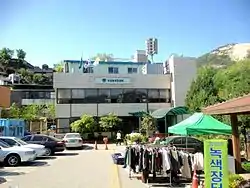Buam-dong, Seoul
Buam-dong is a dong, neighbourhood of Jongno-gu in Seoul, South Korea.[1][2]
Buam-dong | |
|---|---|
| Korean transcription(s) | |
| • Hangul | 부암동 |
| • Hanja | 付岩洞 |
| • Revised Romanization | Bu am dong |
| • McCune–Reischauer | Pu am tong |
 Buam-dong Community Service Center | |
| Country | South Korea |
| Area | |
| • Total | 2.27 km2 (0.88 sq mi) |
| Population (2001)[1] | |
| • Total | 13,300 |
| • Density | 5,900/km2 (15,000/sq mi) |
Attraction
A bronze statue of Choi Gyu-sik (최규식) is on Jaha Gate hill near the Buam-dong residential service office. Choi was a chief of the Jongno police station who killed in the line of duty when North Korean spies tried to penetrate Cheong Wa Dae, South Korean presidential office and residence in 1968.
Another attraction to Buam-dong is the Changuimun Gate, otherwise known as the Northeast Gate of the Fortress Wall of Seoul. Changuimun is one of the Eight Gates of Seoul; its gatehouse is the oldest among the “Four Small Gates” (사소문).
The area is home to a store founded in 1969, Dongyang Bangagan, that sells tteok, traditional rice cakes. It grinds rice to make them at home and sells many varieties, as well as seasonal specialties.[3]
References
- "부암동 (Buam-dong 付岩洞)" (in Korean). Doosan Encyclopedia. Retrieved 2008-04-23.
- "Origin of Buam-dong's name" (in Korean). Jongno-gu official site. Archived from the original on 2004-08-20. Retrieved 2008-04-23.
- Seo, Ji-eun (2 May 2011). "Rice cakes that take you back to the old days". Joongang Daily. Retrieved 27 January 2013.
- "종로구 (Jongno-gu 鍾路區)" (in Korean). Doosan Encyclopedia. Retrieved 2008-04-22.
- "Chronicle of Beopjeong-dong and Haengjeong-dong" (in Korean). Guro-gu Official website.
- "Mapo Information". The chart of Beopjeong-dong assigned by Haengjeong-dong (행정동별 관할 법정동 일람표) (in Korean). Mapo-gu Official website. Archived from the original on 2007-11-05.
External links
- Jongno-gu Official site in English
- (in Korean) Jongno-gu Official site
- (in Korean) Status quo of Jongno-gu by administrative dong
- (in Korean) Buam-dong Resident office
- (in Korean) Origin of Buam-dong name
